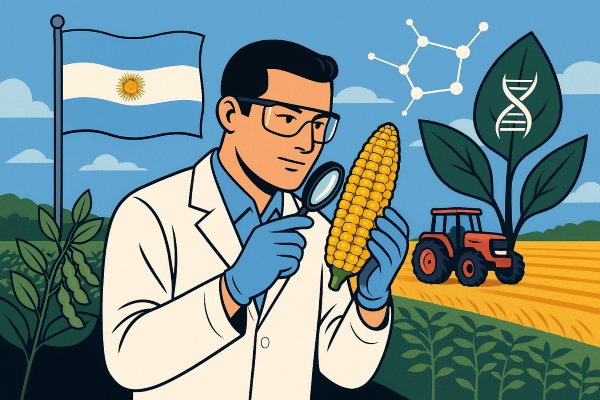Argentina isn’t just known for tango, football, and beef — it’s also a quiet giant in the world of agricultural biotechnology (AgricBiotech). With a regulatory system built firmly on science, innovation, and international collaboration, Argentina has shaped a model that many countries now look to as a gold standard for balancing progress with safety.
In different paper presentations on Agricultural Biotechnology (AgricBiotech) in Argentina, Martin Lema, University of Buenos Aires’ Fernando Bravo, and the Head of Biotech Directorate, Facundo Simeone, gave details of the country’s strides in modern biotechnology during the ABNE Biotechnology and Biosafety Global Virtual Study Tour of Brazil, Argentina, India, and Bangladesh.
The tour, organized by the College of Agriculture and Natural Resources at Michigan State University, toll\\ok place from March 24 to 27, 2025.
Bravo says, “Argentina continues to assert itself as a leader in agricultural biotechnology, with a robust regulatory scheme supporting the development and approval of innovative crop varieties. Recent advances include the approval of HB4® soybean and wheat, both engineered for enhanced drought tolerance critical trait for maintaining yields under challenging climate conditions. The HB4® technology, developed through collaboration between public research institutes and private companies, exemplifies Argentina’s capacity for impactful biotech innovation.”
In addition to drought-tolerant crops, Argentina has advanced virus-resistant potatoes (notably the Spunta variety, engineered for resistance to Potato virus Y) and glyphosate-resistant sugarcane. These projects address major agricultural threats, such as viral diseases and weed pressure, aiming to secure productivity and economic stability for farmers. However, not all innovations reach the market; for example, while glyphosate-resistant sugarcane passed environmental and food safety assessments, it did not clear market impact evaluations, partly due to stakeholder concerns.
Argentina’s ongoing efforts also include developing multi-virus-resistant potatoes and leveraging transcriptomics to combat late blight, demonstrating a commitment to integrating cutting-edge science with practical crop improvement. These initiatives underscore the country’s dynamic approach to biotechnology, balancing scientific advancement with regulatory rigour and market realities.”
A head start in biotech regulation
Argentina took its first major step in agricultural biotechnology (AgricBiotech) regulation back in 1991, setting up the National Advisory Commission on Agricultural Biotechnology (CONABIA). This multidisciplinary body, comprising scientists, academics, government officials, and industry leaders, ensures that every biotech decision is rooted in expertise, not politics.
Some landmark achievements include:
- 1991: Launch of CONABIA.
- 1996: First commercial GMO approval (soybeans).
- 2005: First evaluation of a genetically modified animal (cattle).
- 2014: FAO recognized CONABIA as a global Reference Centre.
- 2015–2021: Pioneering flexible rules for gene-edited crops, streamlining the approval process.
- 2025 (projected): Over 100 GMO approvals and 160 assessments of New Breeding Techniques (NBTs).
Science first, then always
Argentina’s secret sauce? A case-by-case, science-based risk assessment. Each application is judged purely on technical and scientific merit — no shortcuts, no politics. Every supporting document must meet the standards of top scientific journals.
Three pillars guide their assessments:
- History of Safe Use: Leaning on decades of safe GMO consumption globally.
- Familiarity: Evaluating new products by comparing them to already well-known crops.
- Comparative Approach: Confirming new crops are “as safe as” traditional varieties.
Two-phase safety net
Argentina’s regulatory journey for any new biotech product moves through two rigorous phases:
- Phase 1: Contained Tests
- Greenhouse and confined field trials with strict biosafety controls.
- Tailored risk management depending on the crop and test location.
- Phase 2: Commercial Approval
- Deep dives into genetics, agronomy, ecology, and pest resistance.
- Final greenlight comes only after CONABIA’s scientific seal of approval.
Leading the way in gene editing
Long before gene editing became the buzzword it is today, Argentina was ahead of the curve. Through Resolution No. 21/2021, it created a clear, flexible path for innovators using New Breeding Techniques. Innovators can get decisions in 80 working days, helping them move fast while ensuring biosafety remains paramount.
Argentina has already reviewed 160 NBT products, reinforcing its place at the top of the global biotech leaderboard.
Building bridges beyond borders (BBBB)
Argentina’s influence doesn’t stop at home. Through partnerships with Brazil, Paraguay, and Uruguay, the country works to harmonize biotech regulations across the region, smoothing the path for innovation.
Through its renewed partnership with the FAO-CONABIA Centre (extended to 2027), Argentina trains regulators from countries like Kenya, Ethiopia, and Vietnam, helping build global biosafety capacity.
The bigger picture
Argentina’s story shows that with the right mix of science, transparency, and global cooperation, it’s possible to drive agricultural innovation responsibly. By keeping its regulatory framework flexible and science-driven, Argentina is not only future-proofing its agricultural sector — it’s helping the world rethink how we grow our food.
Abdallah is a multiple agricultural award winner, Editor-in-Chief of ASHENEWS and President of the Pan African Agricultural Journalists (PAAJ). He can be reached at www.elkurebe@gmail.com


